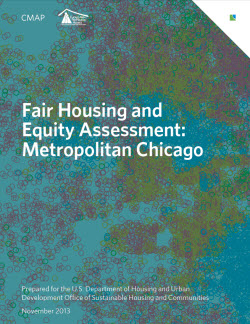Communities with a well-balanced supply of housing enjoy many economic and social benefits as a result. By channeling resources in ways that expand fair housing options for all, metropolitan Chicago will see a more balanced tax revenue stream; an easing of unsustainable development; greater opportunity for regional collaboration, especially related to infrastructure development; enhanced efficiencies in government; and an overall strengthening of global competitiveness.
To promote fair housing efforts throughout metropolitan Chicago, CMAP is conducting a series of projects to discuss and analyze fair housing and its role in the regional economy through coordinated local efforts that promote improved equity and opportunity.
Projects include:
